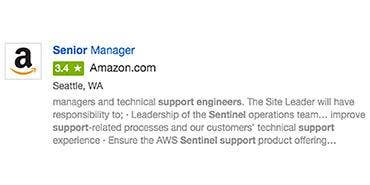Partners: Amazon Web Services Faces Tough Challenge With 'Sentinel' Automated Cloud Offering
Amazon Web Services partners are wary of the cloud giant's top secret effort to build a self-service managed services platform for enterprises, but several told CRN on Thursday that they believe the project will be tough to pull off.
As CRN first reported Tuesday, AWS is developing a new cloud managed services offering -- code-named Sentinel -- which will let large enterprise customers manage and monitor their public cloud workloads independently. It's seen as a potential threat to MSP partners that currently handle these kinds of customers.
While AWS partners generally understand the cloud giant's motivation for developing Sentinel, some doubt whether MSP automation can work in an enterprise market where organizations have a wide range of different workloads and apps.
[Channel Beat: Verizon Strike, AWS Partners On Sentinel]
"There is definitely a push to create a car that drives itself, and fixes itself," one AWS partner said in describing Sentinel. "But most enterprises don't want a car that is automated -- they need customization."
AWS appears to be recruiting staff to run and support the Sentinel product. Listings posted on job sites in December and January referred to an "AWS Sentinel support product offering" and a "Sentinel operations team," according to cached versions of those pages in Google search results. Those listings have since been edited to read "AWS Services" instead of "Sentinel."

AWS is said to be planning to sell Sentinel through a small number of MSP partners around the world, which it has invited to take part in a beta of the product. But sources have also told CRN that AWS intends to sell Sentinel directly to enterprise customers.
AWS spokespeople have so far declined to comment on Sentinel, but a spokeswoman said Tuesday that "we always build services with our partner ecosystem in mind, enabling our partners to leverage and extend whatever we build to create unique value-added solutions for customers."
One source close to AWS said its executives have made no secret of their desire to become an end-to-end managed service provider, because of what they consider to be an unacceptable shortage of skilled partners to serve the enterprise market.
"AWS believes that their MSPs aren't mature enough to handle large customers, so they only really want to work with a few at the top end," said the source, who didn't want to be named because Sentinel is confidential.
Yet several sources acknowledged that many of AWS' current MSPs aren't adding enough value to customers -- in many cases because they haven't adapted to the cloud model and developed skills in areas like orchestration and DevOps, the term for operations teams and software developers working closely to speed cloud software deployment and updates.
"MSPs need to work with customers to convert their infrastructure to Platform-as-a-Service using microservices architecture," said the source. "They also need to bring DevOps into the heart of the organization. Unfortunately, most MSPs don't have the developers that truly understand this."
The AWS Sentinel situation is similar to what's been happening in the Microsoft channel in recent years. Microsoft has been urging partners to develop their own unique intellectual property as a way to "future-proof" their businesses, while debuting free email migrations and other services that compete with offerings provided by its partners.
As a result, some partners that worked exclusively with Microsoft have branched out to support AWS and Google Cloud Platform. Now, some AWS partners are reacting to Sentinel by mulling a similar broadening of their vendor relationships.
One AWS partner who also works with Microsoft and Google said multi-cloud support is a great way to combat the potential threat posed by Sentinel.
"What we see most of our customers find value in from a services perspective is the people and expertise that we provide," said the partner, who didn't want to be named. "These services require intimate knowledge of the customer application and business, and having the expertise to apply that knowledge to the tools and services of a particular services ecosystem is the value we deliver."
The AWS partner added that he "would find it difficult for AWS to engage at that level broadly across their customer base."
Another AWS partner described Sentinel as a "very natural" move, given the dearth of cloud savvy MSP talent. At the same time, he believes it'll be a tough challenge for AWS to build it in a way that appeals to a broad range of customers.
"The operations piece of managed services is extremely difficult," said the partner. "Operations doesn't fit into a neat box -- it's very unique to the customer."